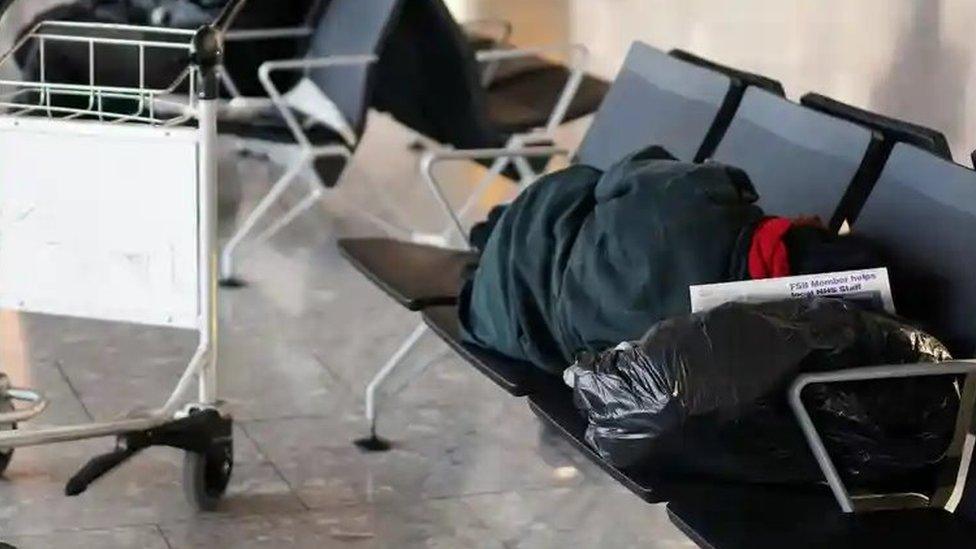Brent teenager gets council homeless policy overturned
- Published

Shadacia White made it possible for more than 1,000 people to be put on the council housing list
A teenager from north London who spent years sofa-surfing and sleeping rough has made a council overturn its housing policy, allowing homeless people to apply for somewhere to live.
Shadacia White, 18, previously won her own case to get on Brent's housing list - but continued legal action to get the policy changed for everyone.
The council said the allocation system was "a mistake" they are "amending".
More than 1,200 homeless people will now be eligible for the housing list.
Ms White said: "While I am pleased that Brent has finally changed its policy, it really shouldn't have taken a homeless teenage student standing up against them to change it."

Ms White, with her brother and her mother, would sometimes sleep at Heathrow airport because it was warm
She, her mother and brother stayed in a variety of temporary accommodation while she was growing up, including camping out at Heathrow airport because it was somewhere warm: "We had nowhere else to go. Mum would just walk around all day in the cold."
Brent Council's policy meant homeless people have been prevented from bidding for housing for the past eight years as they were deemed to have no priority.
Ms White, now a marketing student, said her childhood was made much harder because she had no permanent home.
She was originally told she would not be considered for a social house by Brent Council despite being homeless and living in temporary accommodation.
'Ridiculous Catch 22'
"When I turned 18 I applied to be put on the housing list to get a place of my own and I was stunned when I was told I couldn't be on the list because I am homeless. I just thought how can that make sense as surely homeless people need homes the most?
"It's the terrible position of people being homeless and then not being able to get on a housing list because they are homeless. It's a ridiculous catch 22 situation."
Sam O'Flaherty, the lawyer representing Ms White, said: "It is unfortunate we needed to issue proceedings to ensure this happened.
Regrettably, I am not confident this would have been achieved without Shadacia having fought this all the way to the High Court.
"It is a testament to her that she has managed to achieve this and continued to fight even when she had won her own case."
Photographer Anthony Dawton says people pretend the homeless community "is not there"

Bidding for council housing in Brent - how it works
'Bidding' is used in the sense of 'applying' rather than making financial offer
Brent Council's allocation scheme places applicants in priority bands D to A, where A is the highest priority.
People in higher priority bands out-bid people in lower priority bands who express an interest in the same property on Brent's housing register. People in band D are not allowed to bid at all.
The allocation scheme says homeless applicants have "no priority" and will be placed in band D unless the council has previously accepted a main housing duty towards a homelessness applicant. This requires the applicant to meet specific criteria that goes beyond being homeless, such as having a serious health condition.
However under current housing law councils have to give reasonable preference to homeless people even if they are not owed the main housing duty, meaning Brent's current policy was unlawful.
The council has said it will introduce an additional category as part of the existing Band C.
Applicants who are homeless, threatened with homelessness, or have a priority need but have made themselves intentionally homeless, will also be entitled to a reasonable preference on the housing register, subject to the residence criteria.
The average overall waiting time for a council house in Brent is currently 16 years.

A Brent Council spokesman said the family first came to its attention in February last year and they were placed in temporary accommodation a month later.
"In January of this year, we started a review of our allocations policy in order to make some technical clarifications following changes to government guidelines," he added.
"Ms White's lawyers drew our attention to the fact that we should have given her reasonable preference on our housing register during the eight-week period in which the council is statutorily obliged to work with the family to try to relieve their homelessness.
"We took action immediately and included this amendment in the proposed changes to the allocations policy, which are going through the council's decision-making process."
The council has asked people who may have been affected to contact them, external so their current circumstances can be assessed.
Judicial review proceedings in the High Court have now been put on hold until 15 March 2022 to allow Brent to carry out its promised changes.